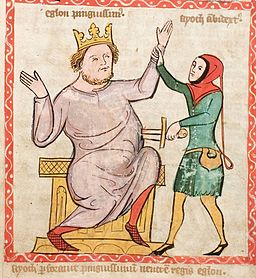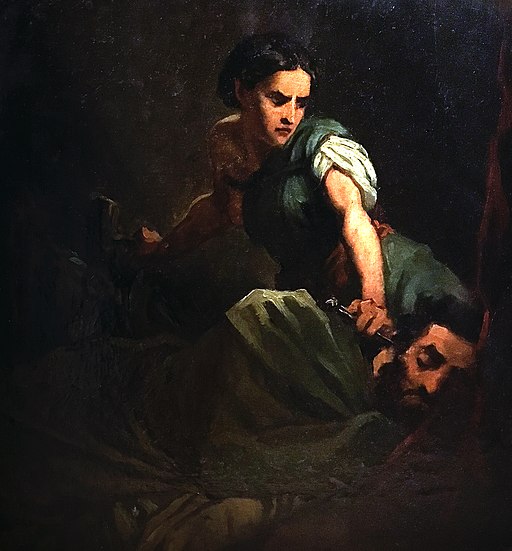It always strikes me as strange when people interpret the Bible to say that women shouldn’t hold positions of authority (except possibly over children and other women). Have they not heard about Deborah?
Not me – the much much earlier Deborah. She lived in a very low-government era, when the people of Israel were governed by a) the Law of Moses (which was short and straightforward enough that ordinary people could actually know the whole thing) and b) a judge.
This simple system had the frequent addition of an oppressive foreign overlord who made the conquered people pay tribute and generally ground them beneath his heel. Because there’s nothing like getting ground under the heel of the oppressor to make you realize (and regret) you’ve been oppressing others yourself: failing to protect the rights of widows and orphans, taking advantage of the poor, or failing to give the land its statutory holidays. (Yes, the actual land.)
This judge, however, was not merely a law court kind of judge, though they did a fair bit of dispute settling. They also acted as the spokesperson for God (who doubled the role of Supreme Court), and they not infrequently took an active part in freeing the Israelites from the oppressive overlord of the day. Case in point: Ehud, who was strategically left-handed long before Inigo Montoya made it cool. (See the Book of Judges 3:12-30, if you like your gore with a touch of grotesquerie – and just a smidge of scatology – and don’t say I didn’t warn you.)
And in the time of Deborah, the judge appointed by God was…Deborah. So she was the arbiter of disputes, and the spokeswoman of God (as well as being the wife of Lappidoth, of whom nothing is known but that he was Mr Deborah, so to speak).
The Israelites were at this point twenty years into Whoops We Did It Again with the latest oppressive overlord and his cruelly oppressive general Sisera. Then they wised up and asked God to save them. (Again.) So God had His spokeswoman Deborah send for a guy called Barak, and when he arrived, she informed him that God had picked him to lead the uprising: go sort out Sisera and his nine hundred iron battle-chariots.
The Book of Judges does not state how old Barak was, but he was clearly past the age where testosterone makes you think you’re immortal, because he promptly said that he wasn’t going unless she went with him. That’s right: Barak wouldn’t go to war to free his people from the oppressor unless Deborah came along to hold his hand.
So she was all “fine, but if you’re going to be like that, you’re not getting the credit for defeating Sisera – God will hand him over to a woman.” And off they went to war, and it actually went quite well: Sisera and his men were routed and they retreated in some disorder. So much disorder that Sisera abandoned his chariot (very attention-getting, your average iron battle-chariot) and legged it on foot.
And this is where Jael comes in. (Some of you were beginning to wonder, no doubt.) Her husband Heber’s clan was actually on pretty good terms with the oppressive overlord – possibly because they were not Israelites but Kenites (related, but not actually Israelites), so they weren’t the ones getting oppressed. So naturally, when Sisera is on the lam, he thinks of Heber’s place as a good place to hide out.
There are some women who believe that it’s a woman’s duty to adhere to her husband’s political views. I’m going to tell you right now that Jael was not one of those women. There are some women who believe that you have to be polite to anyone who is a guest in your home, no matter what. Jael wasn’t one of those women, either.
When Sisera bowled up she went out and greeted him, and showed him in, and got him a drink, and tucked him in when he lay down for a nap (getting routed is very tiring). So far, the gracious hostess. He told her to go and keep watch, and lie through her teeth if anyone came past looking for him. Readers, Jael did not do as she was told. What she did do was take a hammer and a tent peg and nail his head to the ground.
After which, unsurprisingly, he died. And then when Barak finally showed up in hot pursuit, Jael was all “oh, hey, Barak – looking for someone?” and showed him where Sisera was lying dead. Possibly it was somewhat humbling to discover that this chick had killed the general of the opposing forces without so much as breaking a sweat, but Barak seems to have taken it well.
Indeed, he and Deborah sang a triumph song – something I would like to see reintroduced, particularly for such occasions as the Olympics – in which they praised Jael as “most blessed of women… most blessed of tent-dwelling women”. What, after all, would she have done without a tent-peg handy? (And how would she ever have got the mess out of her floor?)
So if someone tries to tell you that women shouldn’t hold positions of authority, or that God doesn’t speak through women, or that women shouldn’t get involved in politics, or that women should keep their opinions to themselves, or that women don’t know how to use a hammer – or even that women can’t achieve anything if they stay in the home – tell them to read the Book of Judges, chapters four and five.
And if that doesn’t work, reach for a tent peg.






Have you ever thought of writing a modern-ish Whodunnit based on this? a la Christie, Marsh, etc.
Based on which aspect? Someone getting a tent peg through their head? The rest of the situation doesn’t seem to fit well with classic whodunnitry – especially Jael being so open about what she’d done.
I suppose one could have a series of Biblically inspired crimes (see also Judith & Holofernes in the apocrypha) but I dare say some noirish crime writer has already done that.
Just remembered the Ngaio Marsh book which does allude to it – A Surfeit of Lampreys.
So you can’t write one without the risk of plagiarism.
Oh, yes! I’d forgotten that.
Thank you for this!
You’re very welcome!